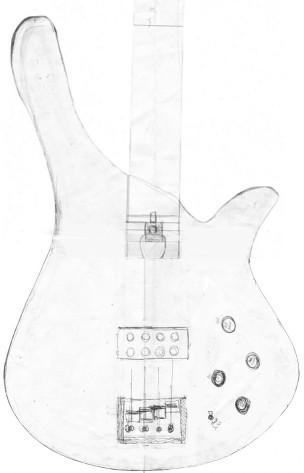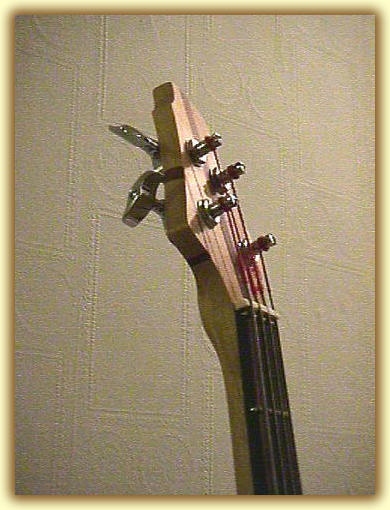|

This is the original
full size working drawing which I used to build this bass. I copied
around this and cut out the body wings on a bandsaw, which isn't
the most accurate was of cutting a body, the slight variation between
this drawing and the final bass is because of this!

Wow! I've still
got this wall paper in my hall, since 1998 when I started this bass!
This picture is pretty bad quality, it was taken with a borrowed
1st generation digital camera (a sony which stored it's files onto
an internal 3.5" floppy), hence the grain and small size. 3
years later, my little Fuji produces far better results. I used
the Fuji halfway through making "Nikki", before that I
used my Canon SLR.
|
Bass 1
My First Bass
Design
A versatile modern
4 String.
---------- o ----------
I needed a versatile
4 string bass. I am most settled and creative when playing a 4,
I guess it's because I've played one for so long! I also found a
company which could supply me a ready slotted 34" ebony finger
board, which alleviates a major headache, cutting the fingerboard
accurately.
One of the nice things
about building your own bass is that you don't have to compromise
the design for the sake of mass production. Each bass is a "one
off", designed and hand crafted around tone, ergonomics and
specific requirements as opposed to machined clones and economics.
Have you got a copy
of Melvyn Hiscock's book, "Make your own electric guitar"?
It's the book that originally inspired me to build my basses back
in 1996. I also spent about 2 years reading every bass review I
could lay may hands on, regardless of bass style so I could make
educated guesses. It sort of progressed from there really. My first
intention was to build a G&L clone (belive it or not, I'm a
traditionalist at heart) but I soon discovered the fundamental weaknesses
of Leo's design and the compromises he made for mass production.
I then read a review of a "Scott" hammerhead bass back
in June 1997's copy of Bassist, which changed my view for ever.
I fell in love with the all-through multi-laminated neck and the
multi-laminated body. "Eve" my first bass was strongly
inspired by a combination of the "Scott" and a Warwick
fortress (which had a MusicMan pickup). "Eve" evolved
out of various sketches but my band requirements dictated that I
really needed a 4 string, fretted with traditional woods. So that
I could used it for 60's/70's and 80's covers without it being too
modern with it's tone. Not realising that the best slap tone comes
from ebony/Maple and mahogany (it's been the sonic driving force
behind most Kent Smith and Alembic basses for years). It's funny
to think that slap playing is old school. it's been around for well
over 25 years!
When I get really
stuck, I wander up to London and send a day trying out axes that
I have no intention of buying, but playing and finding out what
I really like. The trick is to come away with ideas and NOT a clutch
of expensive basses - it's a tough discipline!
I particularly love
basses with all through necks, I like their tone and clarity. I
also like through body stringing, both features often ignored by
mass production and really helps the attack of a note, but I don't
always use it. I like my headstocks to angle back (10 deg),
they give more even string down force and I also like to see a Volute
on my basses, it increases the mass at the neck's weakest point.
My headded basses have a huge, exaggerated volute which certainly
adds a little character to the design.
The Pickup was an
easy choice, my previous bass either had a single coil Jazz and
a split P type pickup. I wanted to try a big fat humbucker. in particular
the Music Man style but I was used to having a variety of sounds
at a flick of a switch and I didn't want to go back to the "Fender
P" days of just one sound. I also knew that a 4 wired pickup
could be coil tapped to give a single coil sound, also there are
phasing options available too. So I finally settled on a single
Kent Armstrong Music Man style pickup (I love Kent Armstrong Pickups,
in fact I insist on them). This bass was also to be a learning exercise
in phasing/switching tones, something I was eager to learn about.
I Reckoned that I could get Musicman, Jazz, Precision (and more)
tones all from one pickup. I used a 6 way rotary switch giving me
every possible wiring combination, which was a nightmare to wire
(three evenings and I ripped it apart twice). On hind sight I think
a simple 3 way on/off/on switch would have been just as effective.
I also bought a Kent
Armstrong 2 band active EQ which allows a passive signal through
it when the battery is disconected. This is an excellent circuit.
It is VERY powerful for a 9v circuit. It also took a long time to
settle in, it sounded quite a sterile until I sheilded it correctly.
I must confess that I like the warmth of the passive tone. But "in
active mode this bass has a killer slap tone", Steve Lawson,
so who am I to argue?
Wood
Choice
Features
|

